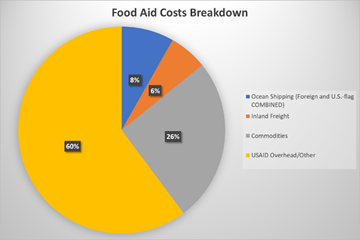FACT CHECK: Cargo Preference & US Food Aid
To combat the misinformation circulating about cargo preference, food aid, and U.S.-flag shipping the unions, associations and carriers in USA Maritime are fact-checking these claims. We encourage you to check our work. References, all from government sources, are cited below.
Claim: There are only four U.S.-flag vessels that can carry food aid.
FACT CHECK: FALSE! There are over 180 ocean-going vessels under U.S.-flag[1]. Many different kinds of ships, including dry bulk, heavy lift, and container ships all carry food aid. To claim otherwise displays an ignorance of shipping!
Claim: Bureaucratic red tape forces USAID to wait for waivers of Cargo Preference Ship American rules.
FACT CHECK: FALSE! USAID can — and regularly does- determine their own waivers[2] of cargo preference without waiting for any other government agency to approve the waiver.
Claim: USAID is forced to use U.S.-flag ships, no matter the price or how long they have to wait for them to become available.
FACT CHECK: FALSE! The statute directs government agencies to use U.S.-flag ships IF they are available at “fair and reasonable rates[3]” – if the ship is either unavailable, or too expensive, USAID can –and does–choose a foreign carrier.
Claim: U.S.-flag ships take longer than foreign flag ships to deliver aid because USAID has to wait for U.S.-flag ships to become available.
FACT CHECK: FALSE! If U.S.-flag ships are not available, USAID can self-determine that they need a waiver and contract with a foreign flag ship—without waiting for any authorization[4]!
Claim: American food will be left to rot on the ports as they wait for American ships to become available.
FACT CHECK: FALSE! If an American ship is unavailable, USAID can use a foreign flag ship, as made explicit in the statute.[5] There is no back up of foreign aid happening now.
Claim: If USAID spent less money on shipping, they would buy more American-grown food.
FACT CHECK: False! U.S.-flag shipping is such a small part of the budget[6]– only 9% combined with foreign shipping–it would not make a significant difference in commodity purchases. Can USAID be trusted to continue to Buy American if they won’t Ship American?
Claim: USAID spends more on shipping than on commodities.
FACT CHECK: FALSE! USAID’s own budget breakdown[7] shows ocean shipping- American and foreign combined – are only 9% of food aid spending. Most of the funding goes to USAID overhead.
Claim: Cargo Preference protects American jobs and sends taxpayer dollars to fellow Americans when possible.
FACT CHECK: TRUE! Cargo Preference protects American jobs, with taxpayer-funded projects supporting our fellow Americans and ensures we have American sealift free from foreign control.
Fact Check Resources:
[1] https://www.maritime.dot.gov/data-reports/data-statistics/vessel-inventory-reports-july-1990
[2] https://www.govinfo.gov/content/pkg/USCODE-2011-title46/html/USCODE-2011-title46-subtitleV-partD-chap553-subchapI-sec55305.htm
[3] https://www.govinfo.gov/content/pkg/USCODE-2011-title46/html/USCODE-2011-title46-subtitleV-partD-chap553-subchapI-sec55305.htm
[4] https://www.govinfo.gov/content/pkg/USCODE-2011-title46/html/USCODE-2011-title46-subtitleV-partD-chap553-subchapI-sec55305.htm
[5] https://www.govinfo.gov/content/pkg/USCODE-2011-title46/html/USCODE-2011-title46-subtitleV-partD-chap553-subchapI-sec55305.htm
[6] https://www.usaid.gov/sites/default/files/documents/InternationalFoodAssistanceReportCongressFY2020.pdf , p. 19
[7] https://www.usaid.gov/sites/default/files/documents/InternationalFoodAssistanceReportCongressFY2020.pdf , p. 19
Senate Concurrent Resolutions 37 & 38 would eliminate the Ship American “cargo preference” rules that are essential to support our US-flag shipping sealift capability.
Today’s environment of rising peer nation competition from Russia and China and a global supply chain crisis is not the time to cede our US-flag shipping capacity to foreign interests–we need to be prepared to support our allies in Europe and elsewhere with American sealift ships and mariners who have never failed our nation in the past.
The proposals are overbroad. They are not limited only to supplies for Ukraine but would waive Ship American rules globally—hurting American workers.
The proposals are duplicative and unnecessary. Under current provisions of law, USAID, USDA, and other shipping agencies of the US Government already have—and frequently use— the ability to self-grant waivers of Ship American rules anytime US-flag ships are not available at fair and reasonable rates.
USAID already has waived Ship-American rules for 40% of the Food for Peace program and consequently US-flag ships carry less than a third of the cargoes under that program.
 Although it is true that commodities account for a minority of USAID’s program costs, more than half of the costs of food aid shipments are USAID’s nebulous “ITSH” and “202(e)” costs (see USAID overhead in chart) which have nothing to do with ocean shipping. All ocean shipping—US and foreign flag costs combined—are only 8% of program costs.
Although it is true that commodities account for a minority of USAID’s program costs, more than half of the costs of food aid shipments are USAID’s nebulous “ITSH” and “202(e)” costs (see USAID overhead in chart) which have nothing to do with ocean shipping. All ocean shipping—US and foreign flag costs combined—are only 8% of program costs.
The premium for hiring US-flag ships is less than 1% of program costs. If we want to make the program more efficient—focus on “ITSH” and “202(e)” which absorb most of the food and program budget—not cutting out American mariners and American jobs.
Although only concurrent resolutions, under provisions of existing law, 56 USC 55305, the resolutions may be deemed to have the force of law sufficient to enact the waiver—however the 55305 authority only contemplates a temporary waiver whereas the S. Con. Res. 37 states no time limit (S. Con. Res. 38 is three years).
The US-flag ships, American businesses, and American mariners that would be hurt by the waivers have not been part of the surge in prices affecting the foreign-flag container shipping markets – we should grow the US-flag fleet to prevent the next supply chain crisis.
The resolutions would hurt our strategic US-flag shipping industry but provide no off-setting benefit to the Federal agencies shipping humanitarian supplies because they already have and use generously their existing waiver authorities.
American taxpayer dollars should support American workers, American mariners, and the US flag fleet.
